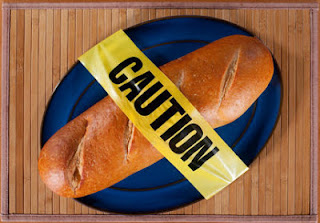Celiac disease and gluten sensitivity is common, dangerous and most people are not diagnosed. A true gluten free diet has been shown to help, so it is important to get testing.
If in doubt, or have trouble getting a reliable test, go gluten free.
A recent study again shows there is a massive increase in the incidence of celiac disease (CD) in recent years, even when diagnosed the usual way. Diagnosis depends heavily on the clinical suspicion of the attending doctor. What that means is that if the doctor doesn't think celiac disease may be part of the problem then no tests will be made.
Bingley reporting in BMJ in 2004, found an incidence of 1 in 100, and for every one diagnosed, 13 were not diagnosed. Less than half had typical gastrointestinal symptoms such as diarrhea.
With that in mind, the authors in American Journal of Gastroenterology do show the incidence of CD increased five-fold from 1.3 per 100,000 in 1999 to 6.5
per 100,000 in 2008, with the highest rates of
increase among those over 34 years of age.
They also showed an association with the diagnosis of infectious gastroenteritis within 3 years of the diagnosis of CD. They admit more study needs to be done on this observation as it does bring to mind many questions such as: were the symptoms that lead to the diagnosis of infectious gastroenteritis (IGE) properly diagnosed, was there an infective organism that leads to the triggering of CD, were there other predisposing conditions that give the same symptoms and could they lead to triggering of CD?
They conclude: Incidence of CD diagnosis in the US military is increasing, particularly among those in the fourth and fifth decades of life and appears higher than other population-based estimates. An association between antecedent IGE and risk of CD was noted, but the potential for exposure misclassification cannot be ruled out and further study is needed to link pathogen-specific exposure to incident CD anti-gluten antibody development or symptom onset.
Read more here: Am J Gastroenterol. 2012 Aug;107(8):1248-55
The best gluten free diet and one that is truly gluten free is a specific carbohydrate diet called "Gut and Psychology Syndrome diet" or GAPS diet. Many, many people don't heal unless they go on a GAPS diet. So why not do it from the start. You can buy the book at Amazon.
